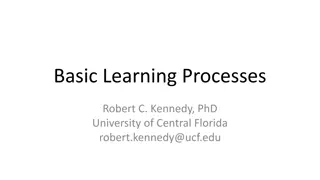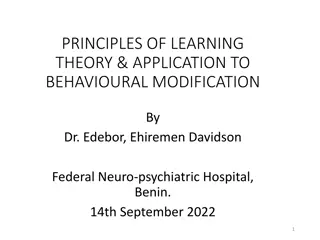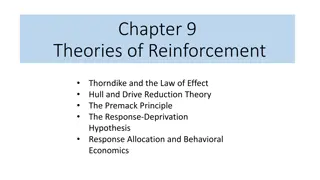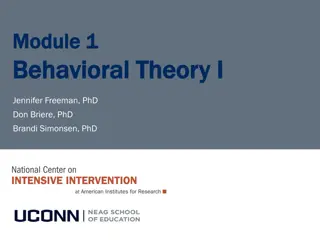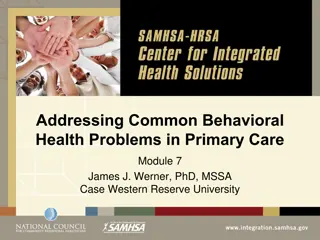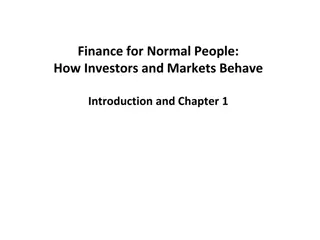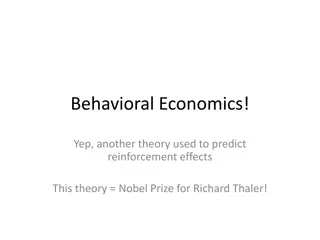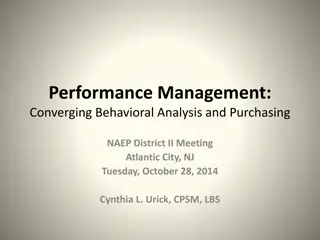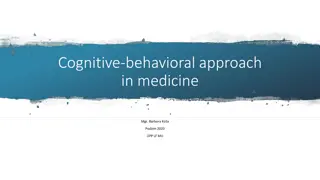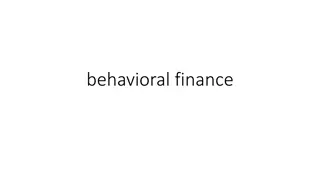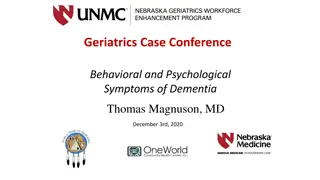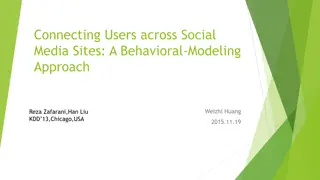Integrating Behavioral Health into Pediatric Primary Care
Integrating Behavioral Health into Pediatric Primary Care is crucial due to the increasing prevalence of mental health conditions among children. This integration aims to bridge the gap between primary care and mental health services, as a significant number of children with mental health concerns a
6 views • 29 slides
Integrating Behavioral Health in Primary Care: Collaborative Care Model (CoCM) Approach
Explore the Collaborative Care Model (CoCM) and Behavioral Health Integration in Primary Care discussed at the North Carolina Community Health Care Association Clinical Conference. Learn about key objectives, roles, billing codes, and resources to promote overall health and reduce treatment gaps and
2 views • 35 slides
Basic Learning Processes
Explore the essential vocabulary related to operant learning and reinforcement, including terms like automatic reinforcer, conditioned reinforcer, and positive reinforcement. Gain insights into theories such as drive-reduction theory and response-deprivation theory. Enhance your knowledge of behavio
3 views • 31 slides
Understanding Social Learning Theory and the Power of Example
Social Learning Theory, introduced by Bandura, emphasizes learning through observation and modeling. It explores how individuals acquire behavioral dispositions, trial-and-error experiences, and the impact of stimuli in the environment. The theory focuses on the importance of attention, retention, a
1 views • 17 slides
Evolution of Mathematical Theories and Proof Systems
Development of mathematical theories such as model theory, proof theory, set theory, recursion theory, and computational complexity is discussed, starting from historical perspectives with Dedekind and Peano to Godel's theorems, recursion theory's golden age in the 1930s, and advancements in proof t
1 views • 29 slides
Psychological Theories of Criminality: Understanding the Roots
Psychological theories of criminality delve into the association between intelligence, personality, learning, and criminal behavior. Major theories include Psychodynamic Theory by Freud, Behavioral Theory by Bandura, and Cognitive Theory by Kohlberg. These theories explore how unconscious mental pro
1 views • 20 slides
Understanding Principles of Learning Theory and Behavioral Modification
Explore the principles of learning theory and its application in behavioral modification, highlighting concepts such as classical and operant conditioning. Learning, defined as a permanent change in behavior due to experience, is distinguished from performance. Discover how learning potential differ
2 views • 48 slides
Understanding the Theory of Firms: Neoclassical vs. Modern Approaches
The theory of firms is explored through the Neoclassical and Modern perspectives. Neoclassical theory focuses on profit maximization, while Modern theory delves into managerial, principal-agent, and transaction cost theories. The discussion covers criticisms of Neoclassical theory and the essential
1 views • 79 slides
Theories of Reinforcement in Behavioral Economics
Explore key theories of reinforcement including Thorndike's Law of Effect, Hull's Drive Reduction Theory, the Premack Principle, Response-Deprivation Hypothesis, and Behavioral Economics concepts such as Response Allocation. Learn about reinforcers as stimuli, primary and secondary reinforcers, the
3 views • 9 slides
Understanding Behavioral Theory in Education
This module delves into the Behavioral Theory in education, discussing key concepts, practical applications, and strategies for implementation. Developed in collaboration with education experts, it offers tools, resources, and activities to enhance understanding and application of behavior support p
2 views • 90 slides
Behavioral Health in Primary Care: Understanding and Addressing Common Problems
Patients visiting primary care often present with physical symptoms that lack clear biological causes, indicating the importance of considering behavioral factors. Up to 70% of primary care visits are related to behavioral health needs, stressing the significance of addressing unhealthy lifestyle be
0 views • 40 slides
Theories of Causation in Psychological and Social Sciences
Overview of theories of causation categorized into psychological, social psychological, and sociological perspectives. Psychological theories focus on instinctive, biological, and psychological qualities of abusers, including Attachment Theory, Psychodynamic Theory, Social Learning Theory, and Situa
0 views • 15 slides
Understanding Behavioral Finance in "Finance for Normal People
Delve into the world of behavioral finance as presented in "Finance for Normal People," exploring how investors and markets behave based on cognitive and emotional factors. The book covers topics such as cognitive shortcuts and errors, emotional biases, and correcting investment mistakes. It also di
0 views • 20 slides
Understanding Behavioral Economics and Its Application
Behavioral Economics is a theory that predicts reinforcement effects, winning Richard Thaler a Nobel Prize. It applies economic principles to behavior, with premises on experimental characteristics, elastic demand of reinforcers, and choice behavior complexity. Terms like demand, commodity, price, a
2 views • 39 slides
Understanding Political Theory through a Contextual Approach
Exploring G.H. Sabine's perspective on political theory through a contextual approach, emphasizing the importance of historical context and societal influences. Sabine argues that while political theory evolves with its contemporary politics, it should be analyzed within its specific time and social
0 views • 9 slides
Understanding Behavioral Therapy in Psychotherapeutics
Behavioral therapy focuses on observable behavior and learning experiences to bring about change and enhance skills. It is used to treat a wide range of psychological disorders and is applicable in various fields such as developmental disabilities, education, clinical psychology, and rehabilitation.
0 views • 20 slides
Evolution of Light Theory: From Wave Theory to Quantum Theory
At the turn of the century, the discovery of the photoelectric effect challenged the wave theory of light, leading to the development of the quantum theory by Max Planck and Albert Einstein. This new theory introduced the concept of discrete energy units known as quanta, bridging the gap between wav
1 views • 62 slides
Clinical Behavioral Support Services: Definitions and Guidelines
Clinical Behavioral Support Services are therapeutic interventions aimed at enhancing individuals' independence and community inclusion. These services involve creating positive behavioral support plans, assessing behavioral needs, providing appropriate training, evaluating plan effectiveness, and e
0 views • 11 slides
Performance Management and Behavioral Analysis in Organizational Psychology
Performance Management involves utilizing Behavioral Analysis techniques to optimize employee behavior and enhance organizational outcomes. By focusing on behaviors rather than personal histories, managers can effectively bring out the best in employees. The ABC Model of Behavior, with its emphasis
0 views • 20 slides
Dp-branes, NS5-branes, U-duality, and M-Theory Overview
Overview of Dp-branes, NS5-branes, and U-duality derived from nonabelian (2,0) theory with Lie 3-algebra. Introduction to M-theory, including M2-branes and M5-branes in the strong coupling limit. Discussion on BLG theory, Lorentzian Lie 3-algebra, and the ABJM theory for M2-branes.
1 views • 32 slides
Understanding Time-Independent Perturbation Theory in Quantum Mechanics
Perturbation theory is a powerful tool in solving complex physical and mathematical problems approximately by adjusting solutions from a related problem with known solutions. This theory allows for more accurate approximate solutions by treating the difference as a small perturbation. An example inv
0 views • 19 slides
Rural Regional Behavioral Health Coordinator Update Report
Valerie Cauhape, MA, MPH, presents updates from the Rural Regional Behavioral Health Policy Board Meeting on July 21, 2020. The report highlights increased demand for behavioral health services, challenges in accessing inpatient providers, and initiatives for Behavioral Health Task Force implementat
1 views • 16 slides
Ethical Theories: Divine Command vs. Virtue Theory Explained
Divine Command Theory asserts that morality is derived from God's commands, contrasting with Virtue Theory which focuses on developing moral virtues to achieve human flourishing and excellence. Divine Command Theory relies on religious texts, while Virtue Theory emphasizes the cultivation of virtues
0 views • 24 slides
Governor's Behavioral Health Services Planning Council Tobacco Subcommittee Report
Tobacco remains a significant risk factor for individuals with behavioral health conditions, with high smoking rates among this population. The Governor's Behavioral Health Services Planning Council Tobacco Subcommittee aims to promote a tobacco-free lifestyle and enhance recovery by addressing toba
0 views • 17 slides
Understanding Fermi Liquid Theory in Interacting Fermion Systems
Fermi liquid theory, also known as Landau-Fermi liquid theory, is a theoretical model that describes the normal state of metals at low temperatures. Introduced by Landau and further developed by Abrikosov and Khalatnikov, this theory explains the similarities and differences between interacting ferm
0 views • 23 slides
Enhancing Conservation Practice Adoption Through Decision Science and Behavioral Economics
Explore how decision science, descriptive and prescriptive decision theory, and behavioral economics play essential roles in influencing operator decisions for adopting conservation practices. The session delves into problem framing, action implementation, alternative development, consequence evalua
0 views • 10 slides
Understanding Cognitive Behavioral Approach in Medicine: A Heuristic Perspective
Cognitive-behavioral approach in medicine, analyzed through affective heuristics and problem-solving heuristics, explores factors influencing decision-making processes and the dual processes theory. Key concepts include fast emotional reactions, reliance on emotion in judgment, reducing cognitive lo
0 views • 30 slides
Computational Learning Theory: An Overview
Computational Learning Theory explores inductive learning algorithms that generate hypotheses from training sets, emphasizing the uncertainty of generalization. The theory introduces probabilities to measure correctness and certainty, addressing challenges in learning hidden concepts. Through exampl
0 views • 43 slides
Automata Theory and Theory of Computation Overview
This course overview covers concepts in automata theory and theory of computation, including formal language classes, grammars, recognizers, theorems in automata theory, decidability, and intractability of computational problems. The Chomsky hierarchy, interplay between computing components, modern-
0 views • 42 slides
Theories of Interest in Microeconomics II
Explore various theories of interest in economics, including the Classical Theory, Liquidity Preference Theory by Keynes, Productivity Theory, Abstinence Theory, Time-Preference Theory, Fisher's Time Preference Theory, and the Loanable Fund Theory. These theories offer different perspectives on the
0 views • 6 slides
Understanding Behavioral Finance and Technical Analysis
Behavioral finance explores irrational behaviors in decision-making processes in finance, highlighting the limitations of rationality assumptions. It delves into information processing problems and behavioral biases that can distort market prices. The consistency between technical analysis and behav
0 views • 43 slides
Exploring the Evolution of Atomic Theory
Delve into the historical journey of atomic theory starting from Democritus and Aristotle's views to modern advancements proving some aspects of Dalton's theory incorrect. Learn about key laws and theories such as the Particle Theory of Matter, Dalton's Atomic Theory, and JJ Thomson's discoveries, s
0 views • 30 slides
Pathways to Excellence Behavioral Health Steering Committee Meeting Overview
The Pathways to Excellence (PTE) Behavioral Health Steering Committee Meeting held on February 17, 2015, reviewed the roles of various organizations, discussed the steering committee membership, and established domains of quality in behavioral health. The meeting focused on reporting meaningful beha
0 views • 16 slides
Behavioral Health Alliance of Montana: Advocating for Behavioral Health Providers and Clients
Formed in 2017 by the Montana Healthcare Foundation, the Behavioral Health Alliance of Montana serves as a unified voice for advocacy on behalf of behavioral health providers and clients in the Central Service Area Authority. With a focus on supporting adult and children's mental health, substance u
0 views • 18 slides
Integrated Behavioral Health Initiative for PHN Practices
The Behavioral Health Initiative (BHI) aims to develop a comprehensive strategy to address mental and behavioral health needs in the PHN regional practice network. It offers training, education, and partnership opportunities for PHN members, including free webinars, office hours, and a yearlong Qual
0 views • 4 slides
Understanding Behavioral Finance: Core Concepts and Anomalies in Investment Theory
Study the economic theory of the human mind applied to behavioral finance, covering core ideas of standard investment theory, empirical anomalies, and major patterns in asset markets. Explore concepts such as excess volatility, long-term reversal, and short-term momentum in investment decisions.
0 views • 68 slides
Understanding Behavioral Symptoms of Dementia in Geriatric Patients
This informational content discusses the various behavioral and psychological symptoms of dementia (BPSD) in geriatric patients, including common symptoms like depression, aggression, anxiety, and apathy. It highlights the prevalence of behavioral issues in dementia patients, their impact on caregiv
0 views • 15 slides
Macromechanical Analysis of Lamina and Tsai-Hill Failure Theory Overview
The Tsai-Hill failure theory is based on the strengths of a unidirectional lamina, incorporating longitudinal and transverse tensile and compressive strengths, as well as in-plane shear strength. This theory, derived from the distortion energy theory, provides criteria for determining lamina failure
0 views • 15 slides
Oregon Health Authority's Behavioral Health Advisory Council Recommendations
Oregon Health Authority's Behavioral Health Advisory Council (GBHAC) is focused on improving access to effective behavioral health services for adults and transitional-aged youth with mental illness and substance use disorders. The council's recommendations aim to advance health equity, early detect
0 views • 17 slides
Behavioral Modeling Approach Across Social Media Sites
This paper explores a behavioral modeling approach for connecting users across social media sites, aiming to identify individuals based on their shared information and unique behavioral patterns. It addresses the importance of verifying ages online and presents a methodology called MOBIUS for user i
0 views • 29 slides


